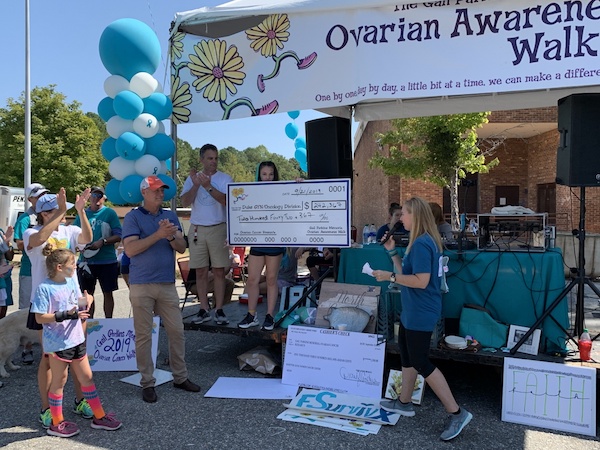Raising Awareness/Advancing Gyn Onc Care & Treatment - Angeles Secord, MD, MHSc

September is Ovarian Cancer Awareness Month/Gynecologic Cancer Awareness Month. Gynecologic Oncologist Angeles Secord, MD, MHSc, shares insight on ovarian cancer in this Duke Cancer Institute article, and is committed to conducting innovative research with nationally renowned colleagues to provide options for cancer patients through clinical trials and ongoing studies.
Dr. Secord advises that while these cancers frequently cause non-specific symptoms that can be hard to identify, women should seek prompt medical attention if any of these common symptoms (bloating; pelvic and/or abdominal pain; feeling full quickly, upset stomach, or trouble eating; having to urinate frequently; extreme tiredness; difficulty having bowel movements; and abdominal swelling) last more than a few weeks.
Clinical Trials and Advancements in Care
At the 2020 IGCS2020 virtual meeting, Dr. Secord's work (along with colleagues from leading cancer institutes and universities through the nation) on a promising clinical trial for cancer patients will be presented at the plenary presentation on Sept. 13, 2020: Quality-adjusted (QA) progression-free survival analyses of veliparib + carboplatin/paclitaxel (CP) vs CP alone in patients with newly diagnosed ovarian cancer.

"Our findings showed that the addition of veliparib to chemotherapy and continued as maintenance had significant patient-centered benefits in terms of quality adjusted-progression-free survival and Q-TWiST analyses (time without symptoms of disease or treatment toxicity)," noted Dr. Secord.
Complete study summary: While poly (ADP-ribose) polymerase (PARP) inhibitors have been shown to improve progression-free toxicity, they are associated with toxicity and increased cost. In order to better understand the benefit of therapy and trade-offs, we conducted quality-adjusted progression-free survival and TWiST (time without symptoms of disease or treatment toxicity) analyses in patients with newly diagnosed stage III/IV high-grade serous epithelial ovarian/fallopian tube/primary peritoneal cancer who participated on the Phase 3 VELIA trial (NCT02470585). The VELIA trial evaluated veliparib, a PARP inhibitor among VELIA patients who were randomized to veliparib added to standard chemotherapy followed by veliparib maintenance compared to those treated with standard chemotherapy and placebo followed by placebo maintenance. The VELIA study was unique from most PARP inhibitor studies, because the PARP inhibitor was given with chemotherapy and for maintenance and not just maintenance alone. The addition of PARP inhibitor with chemotherapy may increase toxicity further. Our findings showed that the addition of veliparib to chemotherapy and continued as maintenance had significant patient-centered benefits in terms of quality adjusted-progression-free survival and Q-TWiST analyses.
Continuous Support Needed
An annual tradition for helping to raise funds for research such as this is the annual Gail Parkins Ovarian Cancer Walk & 5K Run. The event, in its 18th year, will be virtual this year and takes place Sept. 12 through Sept. 26th. The more than $4 million raised since the first event has helped fund several Duke studies — from the impact of ovarian cancer treatment on quality of life to investigations into the impact of genetic alterations on disease progression and implications for new therapies.
Read more about Emerging Options for Gynecologic Cancers here.
More about the Gail Parkins Ovarian Cancer Walk & 5K Run